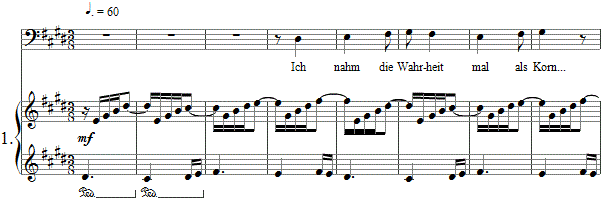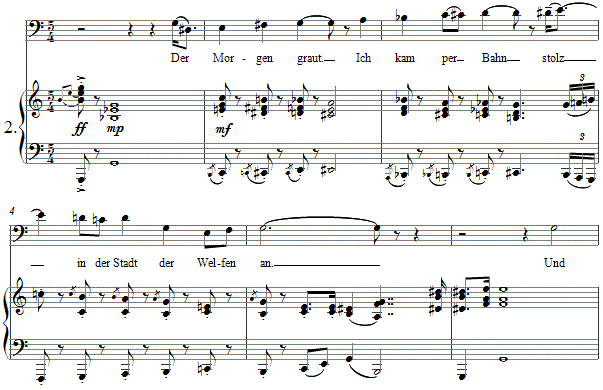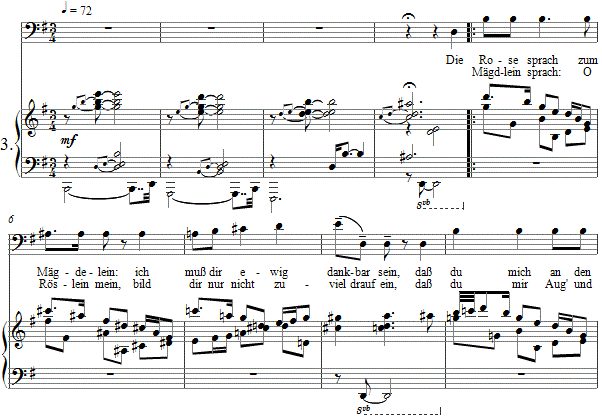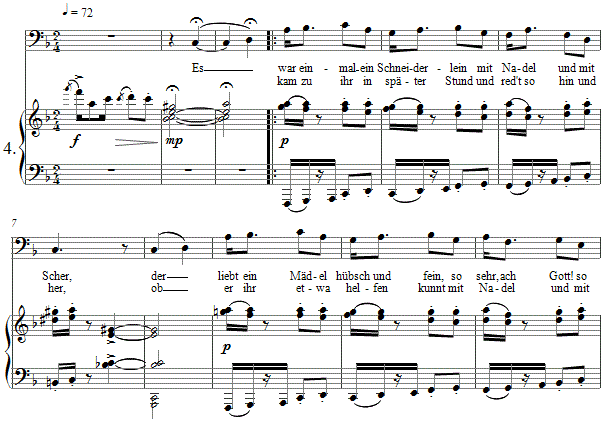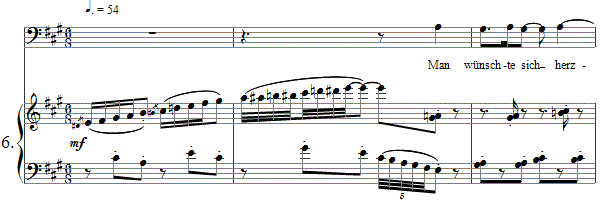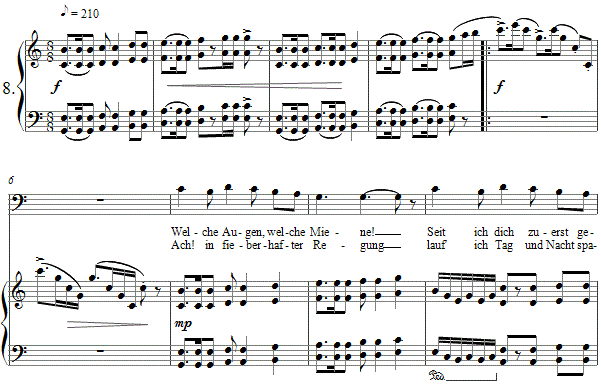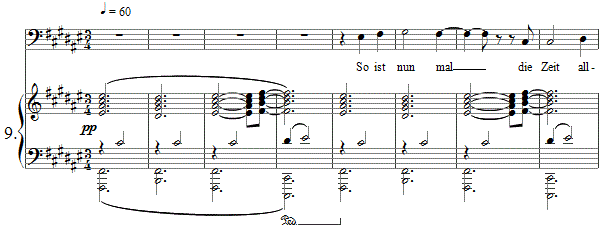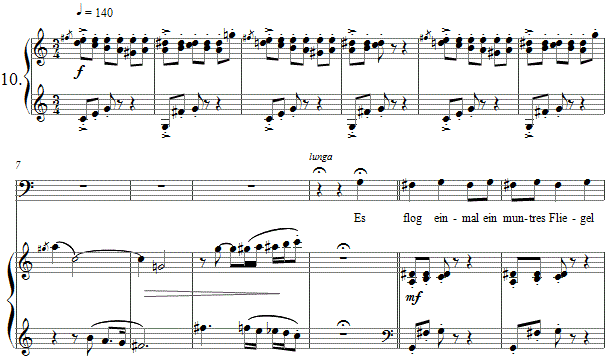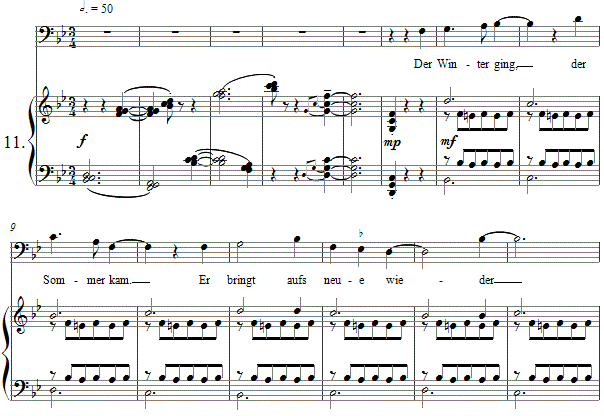Music and Texts of GARY BACHLUND
Vocal Music | Piano | Organ | Chamber Music | Orchestral | Articles and Commentary | Poems and Stories | Miscellany | FAQs
Busch-lieder - (2010)
eleven texts of Wilhelm Busch
for baritone and piano
i. Lüge und Wahrheit - [ 1 page, circa 35" ]
Ich nahm die Wahrheit mal aufs Korn
Und auch die Lügenfinten.
Die Lüge macht sich gut von vorn,
Die Wahrheit mehr von hinten.
ii. Ein galantes Abenteuer - [ 4 pages, circa 2' 30" ]
Der Morgen graut. Ich kam per Bahn
Stolz in der Stadt der Welfen an.
Und wie ich wandle, seh' ich walten
Im Morgenscheine fünf Gestalten.
»Seid mir gegrüßt, ihr edlen Frauen,
So wunderlieblich anzuschauen!«
»Wat het he seggt?!« So tönt's im Chor,
Fünf Besen heben sich empor.
Ich stolp're in ein Kehrichtfaß;
Die Besen sind sehr dürr und naß.
Kaum rett' ich mich, schon halb verdroschen,
Mit 25 Silbergroschen.
Das hemmt der Besengarde Lauf. –
Ein Bad nimmt meine Glieder auf.
So geht's! – Bei Damen sollst du fein
Gar niemals nicht ironisch sein.
iii. Die Rose sprach zum Mägdelein - [ 1 page, circa 1' 10" ]
Die Rose sprach zum Mägdelein:
Ich muß dir ewig dankbar sein,
Daß du mich an den Busen drückst
Und mich mit deiner Huld beglückst.
Das Mägdlein sprach: O Röslein mein,
Bild dir nur nicht zu viel drauf ein,
Daß du mir Aug und Herz entzückst.
Ich liebe dich, weil du mich schmückst.
iv. Romanze - [ 2 pages, circa 1' 45" ]
Es war einmal ein Schneiderlein
Mit Nadel und mit Scher,
Der liebt ein Mädel hübsch und fein
So sehr, ach Gott, so sehr.
Er kam zu ihr in später Stund
und red't so hin und her,
Ob er ihr etwa helfen kunnt
Mit Nadel und mit Scher.
Da dreht das Mädel sich herum!
»Oh je, o jemine!
Deine Nadel ist ja schon ganz krumm,
Geh geh, mein Schneider, geh!«
Der Schneider schrie: »Du falsche Dirn,
Hätt' ich Dich nie gekannt!«
Er kauft sich einen Faden Zwirn
Und hängt sich an die Wand.
v. Innerer Wert - [ 1 page, circa 1' 25" ]
Ein kluger Mann verehrt das Schwein;
Er denkt an dessen Zweck.
Von außen ist es ja nicht fein,
Doch drinnen sitzt der Speck.
vi. Gute Nacht - [ 3 pages, circa 2' 40" ]
Man wünschte sich herzlich gute Nacht;
Die Tante war schrecklich müde;
Bald sind die Lichter ausgemacht,
Und alles ist Ruh und Friede.
Im ganzen Haus sind nur noch zween,
Die keine Ruhe finden,
Das ist der gute Vetter Eugen
Mit seiner Base Lucinden.
Sie wachten zusammen bis in der Früh,
Sie herzten sich und küßten.
Des Morgens beim Frühstück taten sie,
Als ob sie von nichts was wüßten.
vii. Brüderlein - [ 1 page, circa 1' 00" ]
Die Tante winkt, die Tante lacht:
He, Fritz, komm mal herein!
Sieh, welch ein hübsches Brüderlein
Der gute Storch in letzter Nacht
Ganz heimlich der Mama gebracht.
Ei ja, das wird dich freun!
Der Fritz der sagte kurz und grob:
Ich hol'n dicken Stein
Und schmeiß ihn an den Kopp!
viii. Metapheren der Liebe - [ 4 pages, circa 3' 00" ]
Welche Augen, welche Miene!
Seit ich dich zuerst gesehen,
Engel in der Krinoline,
Ist’s um meine Ruh' geschehen.
Ach! in fieberhafter Regung
Lauf' ich Tag und Nacht spazieren,
Und ich fühl' es, vor Bewegung
Fang' ich an zu transpirieren.
Und derweil ich eben schwitze,
Hast du kalt mich angeschaut;
Von den Stiefeln bis zur Mütze
Spür' ich eine Gänsehaut.
Wahrlich! Das ist sehr bedenklich,
Wie ein jeder leicht ermißt,
Wenn man so schon etwas kränklich
Und in Nankinghosen ist.
Würde deiner Augen Sonne
Einmal nur mich freundlich grüßen,
Ach! -- vor lauter Lust und Wonne
Schmölz ich hin zu deinen Füßen.
Aber -- ach! -- aus deinen Blicken
Wird ein Strahl herniederwettern,
Mich zerdrücken und zerknicken
Und zu Knochenmehl zerschmettern.
ix. Die Zeit - [ 1 page, circa 1' 10" ]
So ist nun mal die Zeit allhie,
Erst trägt sie dich, --Dann trägst du sie;
Und wann's vorüber, weißt du nie.
x. Sklaverei - [ 4 pages, circa 2' 30" ]
Es flog einmal ein muntres Fliegel
Zu einem vollen Honigtiegel.
Da tunkt es mit Zufriedenheit
Den Rüssel in die Süßigkeit.
Nachdem es dann genug geschleckt,
Hat es die Flüglein ausgestreckt
Und möchte sich nach oben schwingen.
Allein das Bein im Honigseim
Sitzt fest als wie in Vogelleim.
Nun fängt das Fliegel an zu singen:
Ach, lieber Himmel, mach mich frei
Aus dieser süßen Sklaverei!
Ein Freund von mir, der dieses sah,
Der seufzte tief und rief: Ja, ja!
xi. Immer wieder - [ 4 pages, circa 2' 10" ]
Der Winter ging, der Sommer kam.
Er bringt aufs neue wieder
Den vielbeliebten Wunderkram
Der Blumen und der Lieder.
Wie das so wechselt Jahr um Jahr,
Betracht ich fast mit Sorgen.
Was lebte, starb, was ist, es war,
Und heute wird zu morgen.
Stets muß die Bildnerin Natur
Den alten Ton benützen
In Haus und Garten, Wald und Flur
Zu ihren neuen Skizzen.[ 27 pages, circa 20' 25" ]
Wilhelm Busch
The opus of sometimes acerbic Busch has delighted many generations, especially his Max und Moritz. Among his admirers, Joachim Ringelnatz penned a poem titled "Meister Busch," and in 1954 Albert Einstein wrote that Busch was among the greatest of the German poets. As I learn more of his work, I learn also to appreciate its humor and insight into basic human nature, especially out foibles. For other settings of Busch's texts as I have set them, click here.
Rhymed paraphrases by the composer - Copyright © 2010 Gary Bachlund All international rights reserved.
i. Lies and Truth
I'll take truth over schnapps this very day,
And also the tricksters' lies.
Lies look so lustrous from the front;
And in hindsight, truth proves so wise.
A flowing two-voice accompaniment upholds a simple, diatonic melody in a little introduction to the "lies and truths" one finds among the texts of this cong cycle.
ii. An amorous adventure
The morning came. I arrived by train
In Brunswick, feeling proudly vain.
And as I strolled in the morning light
I saw five forms, none a socialite.
»Good morning, O fine ladies fair,
So wondrous lovely, so debonair!«
»Hey, w'at he say?!" five charwomen cried,
Five brooms threatening to tan my hide.
I stumbled on rubbish and fell to the street;
The five sweeper women were vicious and fleet.
It cost me plenty to rescue myself,
Five and twenty for them as their pelf,
That impeded my beating's severity. --
Later a bath washed off their vulgarity.
Lesson learned! -- Around such creatures
It's best not to tease about clearly absent features.
A fanciful 5/4 meter and odd chromatic gestures begin this story of what today is so annoying referred to, as when a politician "misspoke." Busch's mis-speaking gentleman receives a less that gentle beating as the five washerwomen and their five brooms beat out a five-four rhtyhm.
iii. The rose spoke to the maiden fair
The rose spoke to the maiden fair:
Forever thankful, this I swear,
That you would press me to your breast
Which tells me I'm most deeply blessed.
The maiden spoke: Little rose of mine,
Don't take that as some kindly sign,
As if my eye and heart are glad.
I love only what ornaments me, my lad.
A simple, two strophe song form with simple two voice writing for the accompaniment high above the baritone's tessitura.
iv. Romance
Once there lived a tailor,
Needle and shears his tools,
And he loved a pretty little gal
Too dear, like too many fools.
He came to her quite late one day
To talk of many of a thing,
Such as if he could sew for her
With such skills as he might bring.
The maiden turned on him straightway!
»Oh me, o my, o woe!
Your needle's bent in a useless way,
Now go, you tailor, go!«
The tailor cried, »You're false and crass,
O, if only I had earlier known!«
He bought some thread of the hefty sort,
And hung himself with a tailor's groan.
The storytelling offers two verses in the tonic major, with "sharp" snap rhythms and a secco texture, before moving into the relative minor for the deadly outcome to this "romance."
v. Inner Worth
A clever man honors the pig;
By its reality is he taken.
Outside it may be coarse and big,
But inside is its bacon
Four-part writing sinks by half and whole steps, taking perhaps the side of the pig which is appreciated for what it will become. For beginning in a seeming C major, it cadences on a final F.
vi. Good Night
Good night, we'd bid to one and all;
As Auntie was dreadfully weary;
With peace-filled rest did nighttime fall
Over sleepy eyes, each so bleary.
But in the house there were those two
Who did not heed the Sandman.
To meet Lucinda and pitch the woo,
Cousin Eugene bided with his plan.
Throughout the night until the dawn,
They did as such couples might.
Over breakfast, each stifling a yawn,
They behaved other than they did last night.
A light set of gestures open this tale of an evening, another romance but not like unto the tailor's. The middle section mimics the gentle murmur of Wagner's motive, "O sink hernieder" from the second act of Tristan und Isolde. The passion of that middle section is washed away by the return to the quirky opening and syncopations as per Busch's scenario.
vii. Little Brother
Animated Aunty laughed with glee,
Hey, Fritz, come hug your mother!
See, you've a got a brand-new baby brother!
Last night the stork dropped by and we
By him enlarge our family.
Fritz croaked out his brief reply:
I'll find a nice large rock nearby
And drop on his head; bye bye.
A square duple meter beats out the enthusiasm of the family in an F Lydian and its raised fourth of the scale, while the reply comes in the minor with its many lowered thirds, and a final "nein" by which I end Fritz' unequivocal clarity. The joyous bells ring out before the first verse, and become subdued thereafter.
viii. Metaphor of Love
What eyes, and what a demeanor!
Since first I saw your heavenly face,
For my crinoline angel I grow keener,
While my former ease has left no trace.
O, by such feverish stirring
Am I driven, both day and night,
And to a roar from a tiny purring
Love begins to perspire aright.
And even as I profusely sweat,
You look upon me coldly;
Yet from my head to toes I get
These goose bumps rising boldly.
Truly! This is so disturbing,
For me who must suffer such floods
To find sweating so deeply perturbing
While out in my fanciest duds.
I would that once, but once your eyes
Would look with friendship on me,
O -- with enthusiasm and wondrous sighs,
Melted at your feet there would I be.
But -- O! -- forth from your blazing eyes
Dart looks that leave me battered,
Each look which squashes and mortifies....
With such bone-breaking looks I am shattered.
Emphasizing a 3+3+2 rhythm, this 8/8 meter moves jauntily through the strophes, crossing by major thirds into E major and thence to A flat major tonal regions as the melody and its text seek some reassurance, though none can come. Such is life sometimes, Busch observes.
ix. Time
So is it always that time will go,
First it carries you along, -- then you carry it along;
And when the game's up? You'll never know.
A simple four-measure ground bass provides the long-lined underpinning for a simple hymn. The answer to Busch's question is left unanswered, as are so many questions in life, of life and about life itself.
x. Slavery
Once there was a merry little fly
Who chanced upon a honey pot.
Intent to drink its sweetness dry
Its proboscis dipped and sought.
After the sweetness fully sated it,
It thought it time to fly away;
Well satisfied it stretched each wing.
But its feet were into honey knit
And therein did they sticky stay.
For this the fly began to sing:
"Heavens high, what knavery!
This is a honeyed slavery."
A friend I knew once, more or less,
Just sighed and said: O yes, O yes.
Another dose of Lydian sings out this tale of the one caught in a seemingly lovely trap. The repeated buzzing of the fly's wings as it attempts escape are carried in written-out tremolos in the piano.
xi. Ever Again
The winter's fled, the summer's here.
Breaking forth from spring cocoons
Are beloved reborn things which cheer
Like blossoms bright and brilliant tunes.
Such alterations year by year
Mount up if seen as a sorrow:
What's lived has died, and now is here,
As today yields to tomorrow.
Always a creativity in nature's womb
Rewrites from the oldest parts
In house and garden, woods and fields,
In fresh sketches with it clever arts.
To end this short cycle of Busch's texts, drawn from several different sources in his opera omnia, I chose this reminder that life continues and rebirth in various ways comes to all the world "in house and garden, woods and fields" for the greatest art is life which is both painter and that which is painted. The setting moves through two strophes in B flat with several interpolations of the title as a part of the lyric, before a final statement in G major.
The score for Busch-lieder is available as a free PDF download, though any major commercial performance or recording of the work is prohibited without prior arrangement with the composer. Click on the graphic below for this piano-vocal score.

